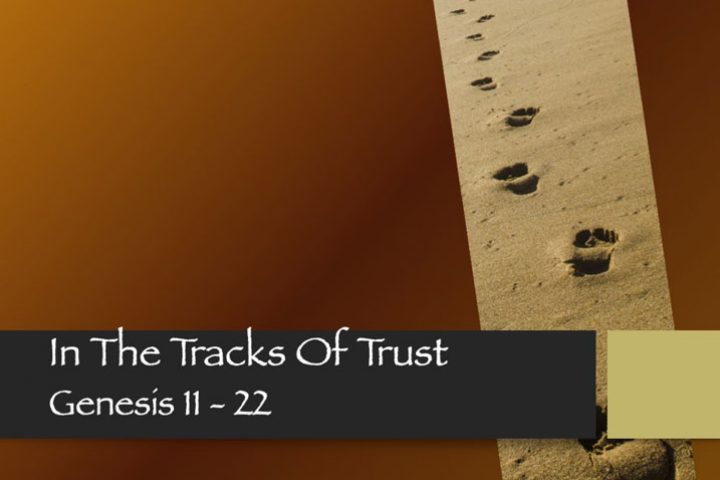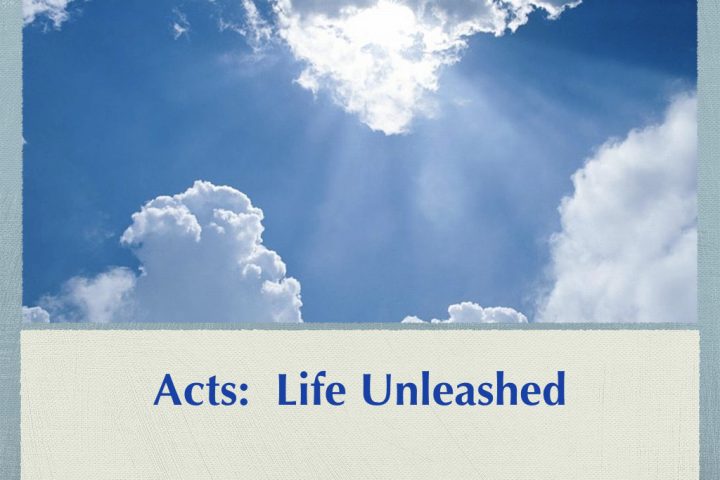Sermons from 2019 (Page 2)
Assurance for Your Amen
Genesis 15
After spending two weeks considering Lot and his life apart from Abram, this week we return to the main storyline of Abram and Sarai, and God’s extraordinary promises to them of land and offspring. This week’s text provides the foundation of much of the theology of Paul, so it is an all-important text for understanding what it really means to walk in trust of the living God.
In God We Trust?
Genesis 14. Last week, we saw Abraham choose peace over conflict and display his trust in God in the area of land, as he allowed Lot to choose first and choose the ‘better’ portion. This week, we will see Abraham drawn into conflict for the sake of Lot and continue to display his trust in God, this time in the area of possessions. Come join us as we consider what it looks like to walk ‘In Tracks Of Trust’ in the area of money and possessions.
In Trust or by Sight?
Paul tells us in 2 Corinthians that when we follow Christ, we “walk by faith, not by sight.” This phrase will be the theme for this week’s study in the lives of Abram and Sarai. Abram and Sarai (and Lot) are back in the land, but another crisis hits. This time, Abram and Lot each have too many possessions for the land to sustain them. What will they do to solve this crisis? They must either choose to walk by faith, trusting in the living God and his promises, or walk solely by physical sight. We are faced with the same option everyday – will we choose to walk in trust of the living God or solely by sight? Genesis 13:5-18
The Ups and Downs of Trust
Genesis 12:4-13:4
Why is “fear not” the most constant refrain in all of Scripture? Because fear prevents us from trusting God and going deeper with him. We learned last week that for Abram and Sarai to be blessed and become a blessing, they must throw their entire weight upon the living God in trust. This week, we see their first crisis. Will they trust God and become a blessing, or fear and miss out on going deeper with him?
Blessed to be a Blessing
Genesis 11:27 – 12:3
This Sunday, I will invite you into an adventure, an adventure of trust, as we begin a study in the lives of Abraham and Sarah, the two most significant people of the ancient world. Corrie Ten Boom’s line is appropriate for this story: “Faith is the fantastic adventure in trusting God.” Over and over again in this adventure, we will be presented with the question, what does it look like to trust God with our lives? In Romans, Paul says to watch Abraham, for Abraham is the father of all those who trust God (Rom 4:11-12). Join us this week as we seek to follow in Abraham’s tracks of trust, blessed to be a blessing.
Rome at Last: The End of the Beginning
Acts 28:1-31 This week we come to the conclusion of Dr. Luke’s two-volume work Luke/Acts. It has been a long, adventuresome journey, especially following Paul’s relentless energy and patient endurance, as he spread the gospel over 10,000 miles, visiting 29 cities, 8 provinces and 2 continents. With great skill, Luke has captured our imagination and held us in suspense through Paul’s countless trials and shipwrecks, wondering how will it all end. Will Paul make it to Rome? Will he get his day in court? Will Paul be vindicated or martyred? On the surface, Luke’s ending seems inconclusive, leaving our questions unanswered. But on closer examination, it fits his purposes perfectly, pulling us into the drama in ways we couldn’t have imagined. Acts 28:1-31
Shipwrecked!
Acts 27:1-44
Have you ever been in a situation when a family member, colleague, or company you worked for was at a potentially dangerous crossroads, and you had the foresight to know the right course of action, but your advice was not heeded and the result was a disaster? It’s even more painful when the consequences impact you and your loved ones, and you can’t do anything about it. That’s the situation Paul finds himself in as he begins his voyage from Caesarea to Rome and ends up shipwrecked. Like Paul, poor choices of others can plunge us into the dark depths beyond our control, making us feel like prisoners to complex social entanglements that put our calling and lives at risk. What do we do? Come Sunday to find out. (Note: Because of the length of the text, it will not be in the worship guide. I encourage everyone to read it before Sunday.)
When Justice is Delayed…Endlessly
Acts 24:1-27
In this week’s text we continue the theme of “Paul and politicians.” Last week we observed how a Roman tribune, who was governed by rules of law, was the instrument God used to rescue Paul from three riots and transport him safely to Caesarea. Having been escorted by half of the Roman garrison in Jerusalem must have encouraged Paul that God was confirming his promise that he would soon testify to God in Rome. But in Caesarea Paul’s hopes are dashed when his case is turned over to Felix, the Roman governor. Felix has no interest in being a servant to the people nor in justice. Rather than giving a ruling on Paul’s case, he vacillates, postpones, manipulates and finally puts his ruling on hold endlessly. What do followers of Jesus do when faced with corrupt officials and the justice due us is delayed with no end in sight?
Paul and Politicians: Before the Sanhedrin
Acts 22:30-23:35 How ought we think about how we relate to structures of power in society? If Jesus is reigning as Lord of the world, what does that imply about how we relate to the authority structures in society? Both Paul and Peter seem to be very clear in their writings that we are to “be subject to the governing authorities” (Rom 13:1-5; 1 Pet 2:13-15). But is it really that simple? What happens when those institutions become corrupt instruments of evil and our submission enables further injustice? In the aftermath of WWII, we condemned those who carried out Hitler’s abominations with the excuse that they were just doing what they were told. So there must be more to our responsibility to governing authorities than mere submission. This Sunday we will get a glimpse at how Paul thought about the structures of power in society, and discover how the kingdom advances in a very imperfect and, in some cases, corrupt world. Acts 22:30-23:35
Riot, Arrest and Defense in the Temple
Acts 21:27-22:29
Having completed our series “Does it Matter,” we will now turn our attention back to the hair-raising drama in the book of Acts, which by divine coincidence puts flesh and blood on many of the themes we explored over the summer. If you were with us in the spring, you may remember Paul’s boundless energy, evangelizing and planting churches throughout most of Asia Minor and Greece. But when Paul arrives in Jerusalem, his whole career abruptly changes. He is assaulted, arrested, brought to trial and endures five trials that transport him from Jerusalem to Caesarea and finally to Rome. Paul the evangelist now becomes Paul the apologist, giving a defense concerning the revelation he has received and the integrity of his character. The fact that Luke devotes six chapters (nearly 200 verses) to these trials is a clue to their theological importance both then and now. Perhaps we should title this section, “Do Apologetics Matter?”
Does Community Matter?
As humans, we long for community, a place of belonging and connectedness. However, these longings are being eroded by a culture that does not make time or create space for deeper relationships. Instead of togetherness there is an increasing sense of isolation and loneliness. The influences of the culture seep into the church. Authentic spiritual community is more difficult to find. Our souls suffer and God’s presence in the world is diminished. This Sunday we conclude the summer series by exploring the question, Does Community Matter?
Does Church Matter?
Church used to be part of the fabric of American life. But, especially in the Bay Area, it is now generally assumed that people do not attend church; we are in one of the least-churched areas of the country. Technology has made it easier for Christians to skip church: you can stream a church service online while drinking coffee at home, or catch a sermon podcast later after going to the beach. So does church still matter? Or is it in an anachronism in today’s society? What is church and why do we “do” church?

